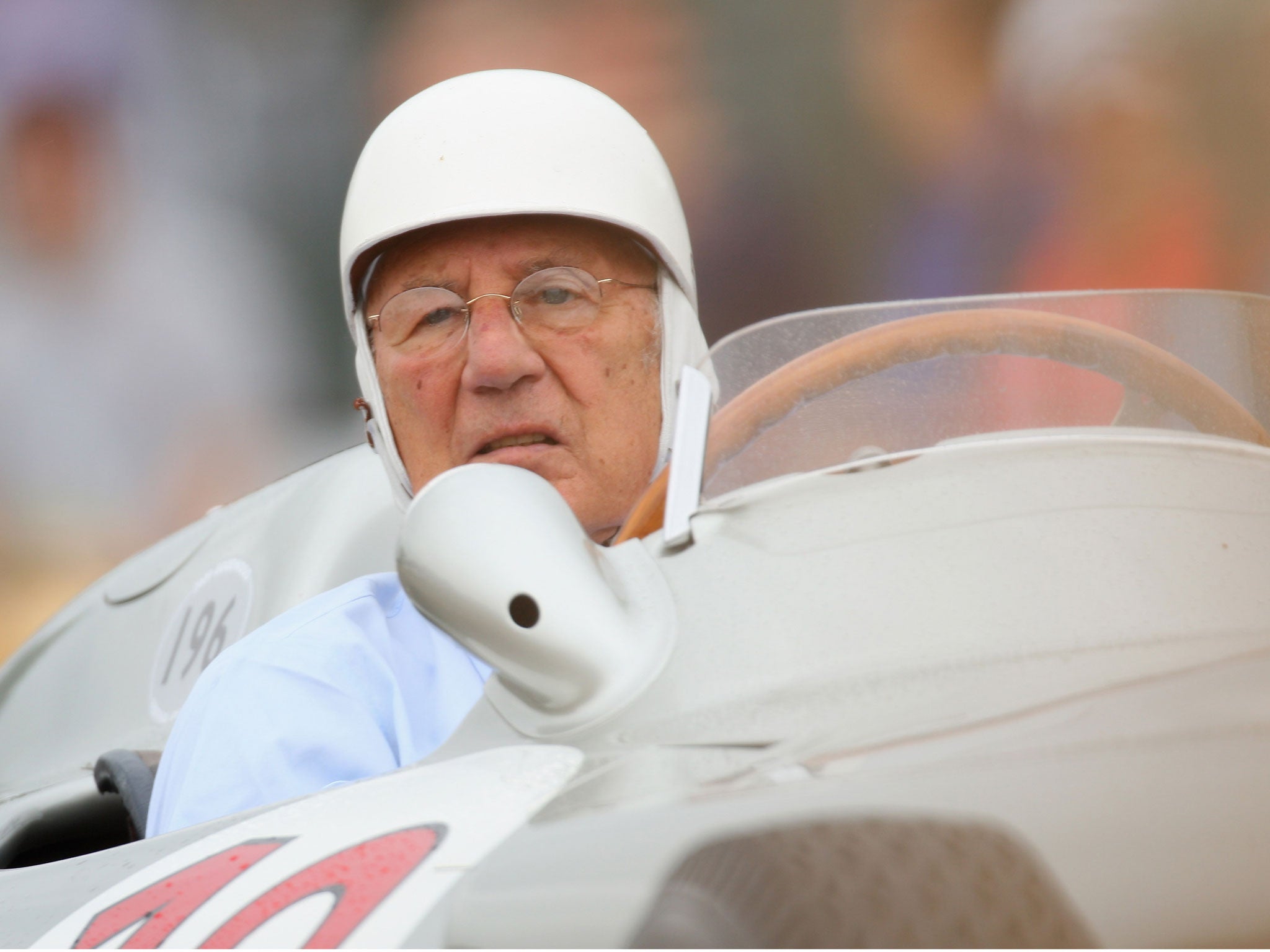Stirling Moss should update his brand of sexism
When we feminists put our time and energy into deconstructing a culture of inequality, the least our adversaries can do is make an effort to stay on-trend

Your support helps us to tell the story
From reproductive rights to climate change to Big Tech, The Independent is on the ground when the story is developing. Whether it's investigating the financials of Elon Musk's pro-Trump PAC or producing our latest documentary, 'The A Word', which shines a light on the American women fighting for reproductive rights, we know how important it is to parse out the facts from the messaging.
At such a critical moment in US history, we need reporters on the ground. Your donation allows us to keep sending journalists to speak to both sides of the story.
The Independent is trusted by Americans across the entire political spectrum. And unlike many other quality news outlets, we choose not to lock Americans out of our reporting and analysis with paywalls. We believe quality journalism should be available to everyone, paid for by those who can afford it.
Your support makes all the difference.Earlier this week, former racing driver Sir Stirling Moss decided that at 83, the time had come to make a foray into biological anthropology. “I think they have the [physical] strength,” he told BBC Radio 5 Live, of female F1 drivers, “but I don't know if they've got the mental aptitude to race hard, wheel-to-wheel...The mental stress I think would be pretty difficult for a lady to deal with in a practical fashion. I just don’t think they have aptitude to win a Formula 1 race.”
His comments were branded shockingly sexist by people with ears, while F1 driver Susie Wolff caught the mood of the post-London 2012 sports media when she described her reaction as “cringe”.
But for active feminists like myself – grown-up riot grrls whose idea of a good time in our 30s is a catch-up at a UK Feminista conference or a Feminism in London ‘feminar’ – Moss’s comments offend for a completely different reason. They annoy, because this is not even contemporary sexism. If Moss had been allowed more time to expand, he might have backed up his points with reference to the four humours. When we put our time and energy into deconstructing a culture of inequality, the least our adversaries can do is to keep up.
The line of sexism that Moss gave an airing this week is the ‘babies and kittens’ strand. It’s same kind mocked in Harry Enfield’s ‘Women: Know your limits!’ sketches, in which ladies are directed not to attempt to ‘win’ in a social situation, but rather to let our “natural sweetness shine through”. How can women compete with men, when we are endlessly distracted by life’s glittering fripperies and a need to nurture everyone? You try to complete a lap at Silverstone, and before you know it you’re baking an apple crumble in your car’s engine for everyone to share at the end of the race.
As an octogenarian, we should cut Moss some slack for seeming out of touch, but not everyone who holds similar views has that excuse. His comments chime with the sentiment of one of my favourite posters produced by the National League for Opposing Woman Suffrage, ‘A woman’s mind magnified’. Using techniques that pre-dated the MRI scan, this artist’s impression of a lady’s brain reveals cerebral clutter including a wedding ring, box of chocolates, puppy, and fabulous hat.
If you’re going to be sexist, be on-trend. Moss should update his brand of gender stereotyping, and fast. Because, like feminism, sexism doesn’t like to stand still. Misogynists must make every effort to keep up with the unequal gender relations of their day and age. Like Lady Gaga upon hearing a forthcoming Madonna single, New Sexism is peeved every time Old Sexism rears its head. Inequality today rarely involves being turned away from a job interview because someone thinks you should be darning socks. It’s a whole different smörgåsbord.
It is, for example, the notable lack of appetite for positive discrimination in women’s favour, as if the status quo were a level playing field. If you object to positive discrimination, you’ll be concerned to hear that’s it’s rife – in favour of men. For example, with around 23 per cent female judges in England and Wales and 21 per cent in Scotland, the UK is among the worst-performing in Europe for female representation in the judiciary. And to recap, around 50 per cent of the country is female, therefore this is a crisis. It’s a crisis that repeats itself across rape reportage and conviction rates; sexual harassment; under-representation of women at the highest levels of the arts and sciences; the persistence of the paygap in the face of legislation; and the fact no one is putting any money into developing a lipgloss that doesn’t stick to your hair.
If today’s inequalities aren’t straightforward, neither are their solutions. Take the paygap. 2013 research from HECSU shows that female graduates consistently ask for lower salaries than their male counterparts, so we can’t blame dastardly bosses alone. But to teach young women to recognise their worth, like any cultural shift, requires a multi-pronged attack over time, and the will for one.
And what is a woman’s ‘worth’? When Kate Middleton was photographed topless on holiday by a paparazzo with a long lens, even tabloids defended her right to privacy. But might we not also relate this act of symbolic violence to a wider and pervasive ‘rape culture’? Daily, we ingest the message that the most interesting thing about any woman is what she looks like without a bra. The feminist group Object, for example, presents compelling evidence that the mainstream media is increasingly saturated with images of sexual violence. So why are we debating trespassing laws? Stirling - any thoughts?
Join our commenting forum
Join thought-provoking conversations, follow other Independent readers and see their replies
Comments